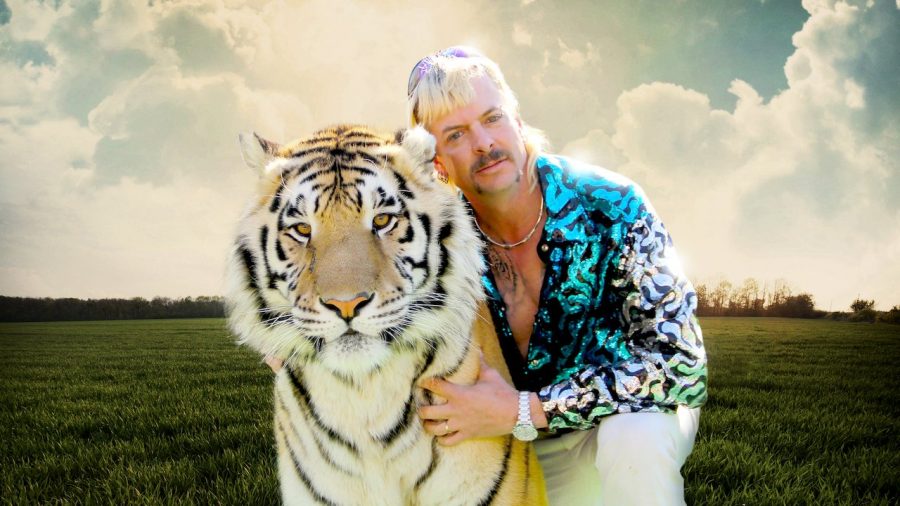“Tiger King” proves to be a must-watch series
The character arc of Joe Maldonado-Passage (better known as Joe Exotic) takes you for a wild ride in Netflix’s new documentary miniseries “Tiger King.” We see many sides of the Tiger King, both the side of him that has a deep love for animals, and his other half that is vengeful and angry, ultimately leading to his downfall.
May 27, 2020
Spoiler Warning: The following review contains spoilers for the Netflix documentary “Tiger King.”
Trigger Warning: The following review and Netflix documentary “Tiger King” contains content relating to violence, guns, animal abuse, suicide, and drug use.
Unless you’ve been living under a rock for the past month and a half, you’ve probably heard of the new Netflix documentary mini-series called Tiger King. From the infamous memes to the city of Minneapolis referencing it in their tweets, it has gotten quite a bit of publicity. So what is all the hype about?
When I say you should watch this as soon as possible, I mean it. This show is incredibly captivating and way outside the norm of what we normally see from Netflix. It’s told through a collection of interviews from different people involved, narrating the story.
“Tiger King”, directed by Eric Goode and Rebecca Chaiklin, follows the story of a self titled “gay, gun-toting cowboy with a mullet” named Joe Maldonado-Passage (better known as Joe Exotic). He owned the Greater Wynnewood Exotic Animal Park (G.W. Zoo) in Oklahoma. Home to one of the biggest privately owned big cat zoos in the U.S., Maldonado-Passage is incredibly self centered and films himself constantly. This also means that the documentary includes a huge amount of home videos, clips from his internet show, and videos from around the zoo that add a lot to the documentary series.
His arch nemesis Carole Baskin owns Big Cat Rescue in Tampa Florida. Maldonado-Passage is constantly under attack from animal rights activists such as PETA and Baskin. Eventually the pressure gets to him and he allegedly pays one of his employees to kill Carole. He was convicted for murder-for-hire plot, and the illegal euthanization of 5 tigers. He is currently serving 22 years at FMC Fort Worth.
But let’s back it up a little and give some history on the man himself. “The Tiger King” was born Joseph Allen Schreibvogel in Garden City, Kansas. He had a troubled childhood growing up gay in the 70s and 80s in the south. His parents weren’t accepting and in his late teens he attempted suicide, breaking his back and leaving him in a brace for five years. While in rehab, his neighbor owned a small private zoo, sparking his love for big cats. They were very therapeutic to him. After his brother was killed in a car crash, Passage decided to open up the G.W. Zoo.
I appreciated that in the documentary they showed many sides of him. It gave him more dimension as a character, instead of being this one sided crazy animal abuser. A part of me actually though he was quite likable. He was charming, and honest, although those traits often got him into trouble as well.
Passage is also polyamorous, and in 2015, he married his two boyfriends Travis Maldonado and John Finlay. (He took Travis’s last name and later, the name of his current husband Dillon Passage). Both would stay by his side for many years. However, a few years later, Finlay left Maldonado-Passage for a woman who had also worked at the zoo after he got her pregnant. Additionally, in 2017 Maldonado accidentally shot himself while high on meth and died. Maldonado-Passage was incredibly broken up by both of these events. He suffered quite a lot of loss in his life.
Now let’s discuss the infamous Carole Baskin. Baskin also had a troubled childhood and ended up leaving home at 15 and shortly after, marrying her first husband Don Lewis. In 1997, he disappeared, and the rumor is that she killed him. This is another debate entirely, but I’ll just say that I think a lot of the evidence points to her. She is currently married to husband Howard Baskin, and they are very happy.
The documentary paints Carole as the “crazy cat lady” trope and makes her seem a little off her rocker. It also highlights details of how her animal conservatory isn’t actually much different than Maldonado-Passage’s zoo. The animals are in cages, and Baskin also used to be a breeder herself, which is one of her main points against Maldonado-Passage in their ongoing battle.
Once again, the fact that we see many sides of Baskin makes her a character with a complex personality. Sometimes you are on her side, sometimes you aren’t. Their back and forth puts you through a whirlwind of belief changes, and makes you question the morals of everyone involved.
One of the other major players in the show is Bhagavan (Doc) Antle. Antle is a fellow big cat owner and breeder. His character gives us a lot of insight into what the world of big cat owners looks like. He’s created something like his own cult at his menagerie. He owns the Institute for Greatly Endangered and Rare Species in Myrtle Beach. He has several wives that live and work at the zoo. An account from Barbara Fisher, former lover and employee of Antle’s zoo, describes the cult-like situation there. 12-14 hour days, very little pay, and having to sleep with Antle in order to move up in the ranks.
Another major character is Jeff Lowe. Jeff gained control of the G.W. Zoo around the time of Travis Maldonado’s death. He is certainly not an innocent man and let’s just say he has skirted through a lot of his life illegally. During the time that Maldonado-Passage was running his presidential campaign (that’s a whole other story), Lowe took the opportunity to almost completely take over the zoo. His character starts as a bit of a savior but he soon turns into one of the biggest villains of the show, having very little compassion for the animals.
Jeff Lowe was also allegedly involved with the murder-for-hire plot, although he was never convicted of anything, and never went to jail. To this day, he owns the zoo, running free while Maldonado-Passage is locked up. I personally believe that Lowe deserves to be in jail same as Maldonado-Passage, but alas, it is not up to me.
The big cat world is full of injustices, whether it is animal abuse, murder, or drugs, it is crazy. I thought that this documentary perfectly captured it and shed light on the awful things going on behind closed doors.






